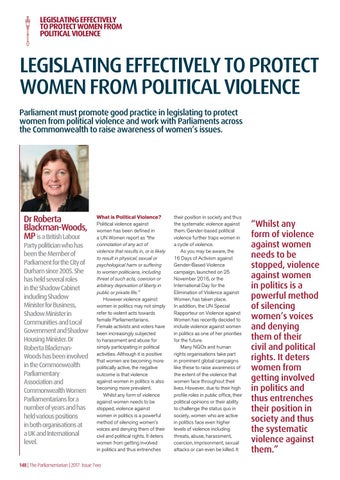LEGISLATING EFFECTIVELY TO PROTECT WOMEN FROM POLITICAL VIOLENCE
LEGISLATING EFFECTIVELY TO PROTECT WOMEN FROM POLITICAL VIOLENCE Parliament must promote good practice in legislating to protect women from political violence and work with Parliaments across the Commonwealth to raise awareness of women’s issues.
Dr Roberta Blackman-Woods, MP is a British Labour
Party politician who has been the Member of Parliament for the City of Durham since 2005. She has held several roles in the Shadow Cabinet including Shadow Minister for Business, Shadow Minister in Communities and Local Government and Shadow Housing Minister. Dr Roberta BlackmanWoods has been involved in the Commonwealth Parliamentary Association and Commonwealth Women Parliamentarians for a number of years and has held various positions in both organisations at a UK and International level.
What is Political Violence? Political violence against women has been defined in a UN Women report as “the connotation of any act of violence that results in, or is likely to result in physical, sexual or psychological harm or suffering to women politicians, including threat of such acts, coercion or arbitrary deprivation of liberty in public or private life.” However violence against women in politics may not simply refer to violent acts towards female Parliamentarians. Female activists and voters have been increasingly subjected to harassment and abuse for simply participating in political activities. Although it is positive that women are becoming more politically active, the negative outcome is that violence against women in politics is also becoming more prevalent. Whilst any form of violence against women needs to be stopped, violence against women in politics is a powerful method of silencing women’s voices and denying them of their civil and political rights. It deters women from getting involved in politics and thus entrenches
148 | The Parliamentarian | 2017: Issue Two
their position in society and thus the systematic violence against them. Gender-based political violence further traps women in a cycle of violence. As you may be aware, the 16 Days of Activism against Gender-Based Violence campaign, launched on 25 November 2016, or the International Day for the Elimination of Violence against Women, has taken place. In addition, the UN Special Rapporteur on Violence against Women has recently decided to include violence against women in politics as one of her priorities for the future. Many NGOs and human rights organisations take part in prominent global campaigns like these to raise awareness of the extent of the violence that women face throughout their lives. However, due to their high profile roles in public office, their political opinions or their ability to challenge the status quo in society, women who are active in politics face even higher levels of violence including threats, abuse, harassment, coercion, imprisonment, sexual attacks or can even be killed. It
“Whilst any form of violence against women needs to be stopped, violence against women in politics is a powerful method of silencing women’s voices and denying them of their civil and political rights. It deters women from getting involved in politics and thus entrenches their position in society and thus the systematic violence against them.”
